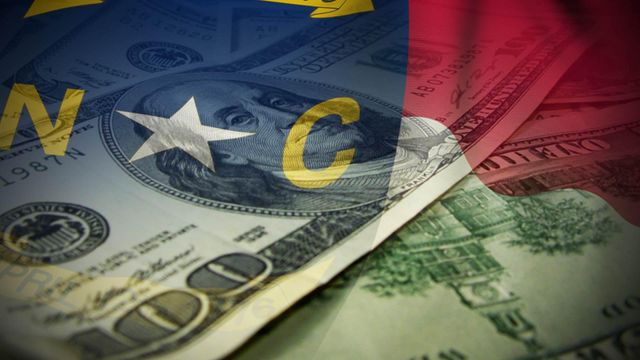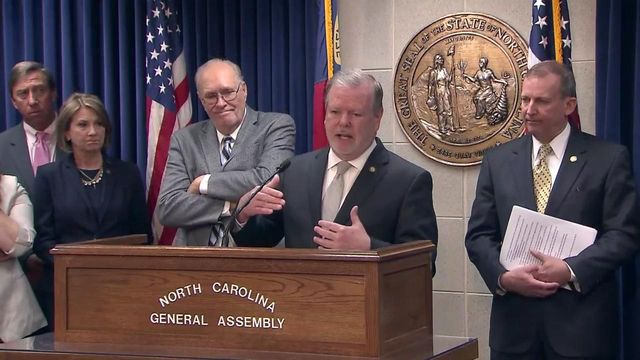Senate budget flips script on raises for teachers, state workers
Senate leaders rolled out on Tuesday their proposed $23.9 billion budget for 2019-20, and while the total spending matches that of the House budget, there are some stark differences in how the two chambers divvy up the money.
Posted — UpdatedThe Senate, for example, wants to give state workers 2.5 percent raises in each of the next two years, which Sen. Harry Brown, R-Onslow, one of the Senate Appropriations committee chairmen, called the largest increase in more than a decade.
"Far too often, state employees have not been made a priority in state budgets. They were treated as a afterthought in the process, if they were thought of at all," said Robert Broome, executive director of the State Employees Association of North Carolina.
State workers received no raises at all in five of the last 10 years, Broome said. In other years, they were given minuscule raises compared with what was handed out to teachers, he added.
"It's not possible to make up for decades of inequity in one year, but you have to start somewhere," he said. "The time has come for lawmakers to prioritize the pay of all state employees."
Over the last five years, Brown said, lawmakers have given teachers raises of 20 percent, while state workers have gotten 7.6 percent.
Brown noted veteran teachers also would get annual bonuses under the Senate plan: $500 for those with 15 to 24 years of experience, and $1,000 for those with 25 or more years in the classroom. The Senate plan also provides incentives to recruit top principals to low-performing schools: $30,000 a year over three years.
The North Carolina Association of Educators immediately rejected the proposal, with President Mark Jewell saying in a statement that neither the House nor the Senate are "taking their constitutional commitment to the students of North Carolina seriously."
"The tiny proposed increases in educational funding are still wholly inadequate to address the needs of our students today and do nothing to remedy the past unmet needs of student mental health and educator shortages that severely threaten their future," said Jewell, whose group organized mass teacher protests at the legislature this year and last.
The Senate budget proposal also includes incentives to fill positions in prisons. Corrections officers would get $2,500 to $7,500 in addition to the annual raise if they go to a prison where at least 20 percent of the positions are vacant.
While the House budget provides a one-time boost for state retirees in 2020-21, the Senate foregoes any cost-of-living adjustments to monthly pension checks in its plan.
"We've made a conscious decision [that], because of pressures that we've got on the retirement system itself," Senate President Pro Tem Phil Berger said, "we just didn't have the capacity to do that."
Sen. Brent Jackson, R-Sampson, another Senate Appropriations committee chairman, noted that the Senate plan fully funds the retirement system, so retirees would continue to get their health benefits and their pension checks.
Senate leaders plan to vote their budget through the chamber by the end of the week, then negotiate a final plan with the House to send to Gov. Roy Cooper. Since neither chamber's budget contemplates expanding Medicaid as Cooper proposes, the budget could be heading for a veto, setting up a standoff between the Republican-controlled legislature and the Democrat governor.
Cooper spokesman Ford Porter said in a statement Tuesday that the Senate budget, "leaves out Medicaid expansion that would close the health care coverage gap and it shortchanges public schools in exchange for more corporate tax cuts."
"The Governor hopes to continue working with the House and Senate on a budget that does more to help hard working North Carolinians," Porter said.
Berger noted that the Senate plan spends an extra $200 million on Medicaid. "Some people would call that expansion," he said.
Other highlights of the Senate proposal:
- Expands the standard deduction for married couples filing jointly from $20,750 in recently passed legislation to $21,000.
- Rolls back the state franchise tax on businesses further than the same recently passed legislation.
- Includes annual registration fees for hybrid and electric vehicles that the House removed from its budget. Electric vehicle owners would pay $230 when they initially register their vehicle, and plug-in hybrid owners $115.
- Provides money to hire 100 school psychologists, as well as other funding related to school safety.
- Gives teachers $300 each for school supplies.
- Earmarks $4.8 billion over the next 10 years for public school construction.
- Includes $64 million to implement the "Raise the Age" effort later this year, which ends the practice of trying all 16- and 17-year-olds as adults.
- Includes $8,2 million in funding over two years to move the state Division of Motor Vehicles headquarters from Raleigh to Rocky Mount.
- Includes $15 million for substance abuse treatment programs.
- Cuts much of the $31 million previously planned for grants to lure television and film projects to the state. Grants also would be capped at $1.5 million instead of the current $3 million.
- Adds $1 billion to the state's "rainy day" reserve fund and leaves another $700 million plus unspent at the budget's bottom line in the first year, providing cushion if revenues don't come in as high as expected or if more money is needed to pass a compromise budget between the House, the Senate and the governor.
- Commits $3 million in 2019-20 and whatever is needed after that to eliminate a backlog of rape evidence kits needed to be tested for DNA.
- Spends $2.5 million on a monument at the State Capitol honoring the contributions of African-Americans to North Carolina.
- Creates the "Viable Utility Reserve" contemplated earlier this session to help struggling water and sewer systems around the state update their infrastructure, merge or split. The Senate budget puts $7.5 million in seed money into the fund in its first year and $10 million in the second.
- Includes a $15 million loan to the city of King for water and sewer upgrades. There are also water and sewer grants of six and seven figures to Maysville, Four Oaks, Midland, Wilson's Mills, Salemburg, Bethel and Sampson County.
Related Topics
• Credits
Copyright 2024 by Capitol Broadcasting Company. All rights reserved. This material may not be published, broadcast, rewritten or redistributed.






